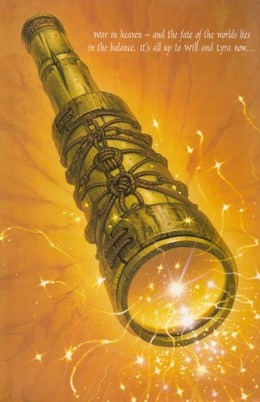Greetings.
Jewish date: 19 Marḥeshwan 5770 (Parashath Wayyera’).
Today’s holiday: Friday of the Thirty-First Week of Ordinary Time.
Worthy causes of the day: “Take Action: Keep up the heat | Save Darfur”, “We Need Generic Drugs: Ask these Senators to Fight « Public Option Please”, “AARP - Health Action Now!: Tell the House: Pass the health reform bill!”, “We deserve an up-or-down vote!”, “Joe Lieberman must go.”, and “Take Action: Ask the Obama Administration to save Coal River Mountain”.
Topic 1: Chapters 1 and 2 of The Amber Spyglass (His Dark Materials, Book 3) by Philip Pullman. I have heard it claimed that an atheist once visited the Lubavitcher Rebbe and told him, “I don’t believe in God.” The Lubavitcher Rebbe replied, “The God you don’t believe in, I don’t believe in Him either.” This story may well be apocryphal, but it reflects Pullman’s depiction of religion both in general and the specifics. Will Parry, searching for Lyra Silvertongue, meets two angels, Balthamos and later Baruch. From them he learns about the Authority/God. Angels, in His Dark Materials, are consciousness itself. They came into being when matter first tried to understand itself. The Authority, rather than being a creator, is the first angel that ever existed, and he has made himself out to be a true god and imposes his will on everything else. This, frankly, is unlike the god of any real religion known to me. The nearest I know of would be the Demiurge of Gnosticism, an evil being who falsely claims to be the true god. However, the Demiurge, unlike the Authority, is the creator of the material world, and above and beyond him there is a genuine, immortal, ultimate deity. As far as I can tell, the Authority is a kind of god no one believes in. This is yet another failure of Pullman to depict religion realistically in a long list of such failures, and I have no hope that things will get any better in this series.
Topic 2: There is a good chance I am going to get complained to if I do not mention the Fort Hood incident yesterday, even though I do not want to. I burned out long ago on the violence committed all over this planet in the name of Islam, and I do not expect such violence to end anytime soon. Islamic violence started after Muḥammad was forced out of Mecca. He had had little success in convincing anyone he was a prophet (due to complete lack of evidence) or converting people to his new religion. His message changed when he reached Medina from one of peace and harmony to one of intolerance and conquest. It was at this point that Islam really took off, with people converting because they did not want to get beaten up or killed by Muḥammad and his thugs. Muḥammad conquered much of the Arabian Peninsula in his lifetime, and after his death Muslims soon went on to conquer a swath of land stretching all the way from the Atlantic Ocean to the Pacific Ocean, converting many and using violence and terror to subdue the rest. Subject peoples (dhimmis) had to live under harsh restrictions. Though theoretically protected if they followed the rules Muslims set for them, in practice even an unfounded accusation of misbehavior could be enough to give Muslims an excuse to commit acts of violence against or murder them. To this day, Muslims regularly use violence against those who do not agree with them. Muḥammad set the precedent, and Muslims have to deal with it one way or another. Last I heard it was not clear why the suspect in the Fort Hood shootings, Major Nidal M. Hasan—a Muslim, opened fire and killed and wounded on his fellow soldiers, but he reportedly was horrified by the idea of having to go to Iraq and was feeling a lot of stress because of it. Given the precent and the fact that he was extremely upset, for all I can tell he may have simply decided that killing non-Muslims was as an effective and religiously correct way of dealing with his problem as any other.
Articles on the incident: “Rampage kills 12, wounds 31” and “Troubling portrait emerges of Fort Hood suspect”.
Peace and Shabbath shalom.
Aaron

![Reblog this post [with Zemanta]](http://img.zemanta.com/reblog_e.png?x-id=8b95fedc-5b31-47d6-a020-dbc18d57fc06)
No comments:
Post a Comment